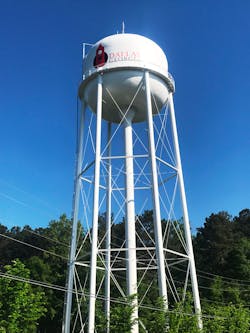A meter modernization upgrade is an exciting yet challenging endeavor for any water utility. The hunt to find the latest technology and confirm the benefits for the utility and its water customers is well worth the time and investment.
For example, utilities can start small with pilot testing before diving head-first into an extensive rollout of new technology. A smaller pilot program allows utilities to uncover some specific benefits that meet their overall system objectives.
The City of Dallas, Ga., tested the waters before deploying a new smart utility network — a combination of intelligent measurement tools, a communication network and advanced analytics capabilities. The municipal water utility strives to deliver superior customer service for the city’s 14,000 residents. They are also strategically focused on gauging water loss even when faced with new challenges such as the COVID-19 crisis.
Cultivating Advanced Data Capabilities
When Dallas launched an initiative to get a handle on water loss, they didn’t know how far the journey would take them. Solid results from an initial smart metering upgrade led to the realization that they had just scratched the surface of what could be possible.
“It was clear early on that our water loss control initiative would pay off well into the future, so we jumped at the opportunity to understand what more we could do,” said City of Dallas billing clerk Amber Whisner.
The city’s pilot program with smart water meters netted a $12,000 return in just four months by helping reduce non-revenue water (NRW). Whisner and her team knew it was time to explore more ways to reduce water loss and improve service.
Every Drop Counts
NRW is an industry-wide issue and state government regulations also started putting more pressure on the city to conserve resources.
“Georgia is at the forefront of movements happening across the country to improve sustainability,” said Whisner. “Every utility in our state is now required to have a water loss control program and submit yearly audits to show results.”
The city decided to expand their metering upgrade program to address water loss. They chose to deploy a smart utility network from Sensus, a Xylem brand, as the next step in their journey.
Strategic Intelligence
With an aggressive, five-year timeline, the City of Dallas expanded the rollout of Sensus iPERL® residential water meters and added OMNI™ commercial meters to their arsenal. Backed by the secure, two-way FlexNet® communication network for real-time remote monitoring, the city was able to quickly address leaks.
“We could resolve issues within hours that might have taken us 30 days to even identify with our old system,” said Whisner. “The network helped us make a major dent in water loss and improved billing accuracy for customers.”
The value of the system became more apparent as the city continued the rollout.“It didn’t take long for the entire system to pay itself off in terms of the money we saved from reducing water loss,” said Whisner. “Within one year, we eliminated 12 million gallons of lost water.”
Relieve the Pressure
Hungry to see what else was possible, the city’s water team began looking for other ways to advance their water loss program. The city launched a pilot program with Sensus ally® water meters combined with Sensus Analytics for enhanced pressure monitoring across residential accounts in three targeted zones or district metered areas (DMAs).
“It was the next big step for us to take to combat water loss,” said Whisner. “We were able to get more data from our system and gain better visibility into the water cycle.”
The solution allowed staff to pinpoint issues beyond leaks, such as a broken main or open hydrant. The city also analyzed data to catch background leakage.
“Data analytics helps us identify areas with leaks that we can’t see underground due to small cracks or pipe deterioration,” said Whisner. “Adjusting the water pressure in those areas can help address any issues and it also protects our infrastructure over the long run.”
A Universal Challenge
The City of Dallas’s latest challenges are ones that many municipalities are dealing with amid the COVID-19 crisis — keeping essential services flowing and maintain workforce safety. The city’s smart utility network allows remote operations and ways to connect with customers while following social distancing guidelines.
“We’ve joined residents in taking measures to help flatten the curve,” said Whisner. “Having our remote system in place helps us provide service to customers even if we’re not in the office.”
The city remains committed to advancing their water loss control program with bold goals for the next part of their journey.
“We’re aiming to reduce annual water loss from 47 million gallons lost per year to less than 10 million gallons within the decade,” said Whisner. “That’s an ambitious goal for a utility, but we have the infrastructure in place to make it happen.”
Conclusion
Water utilities across the globe face similar challenges with customer service demands, water loss and maintenance needs. Utilities have the opportunity, right now, to meet these challenges head on. The City of Dallas example demonstrates that the right investment in technology and the right approach to system test and deployment can position a utility to better serve their customers now while preparing for what the future holds. WW

